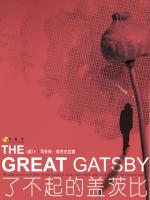The American Dream
“The Great Gatsby” is a novel about a typical American youth in the twenties —Gatsby, and his pursuit for the American dreams, which rooted deeply in the soul of each American from the very beginning of the May Flower. The dream has been written in the second sentence of “The United States Declaration of Independence” which states that “all men are created equal, and they are borned with certain inalienable rights which includes “life, liberty and the pursuit of happiness.”The dream means a belief that as long as you take a hard struggle, you will be able to achieve the ideal of a better life, that is, people have to work through their own hard work, courage, creativity and determination to move towards prosperity, rather than rely on specific social classes and other assistance, which as we know, advocates that one can achieve whatever he or she likes through continuous efforts.
Yet, the dream has already became a nightmare. During the Industry Revolution, the money-orienting, power-persuing minds springing up. Americans have fallen in not only luxurious enjoyment, but the morality of heart that they persued prosperity with all costs of which they were oblivious.
Luckily, the author saw the reality much more clearly than the blind masses. The tragedy of Gatsby pointed out that the dream has led to an emphasis on material wealth as a measure of success and happiness, but real happiness may not always be that simple. The American dream may more like a cruel joke than a genuine dream.
The most biting criticism and impressive scene of the novel is Gatsby’s lavish party. The author spent a fair amount of ink on the music, the laughter and the faces, all blurred as one confused mass, which showed the purposelessness and the loneliness of the party-goers beneath their marks of relaxation and the air of joviality. All this was the typical of “the Jazz Age”. The unrestrained life, the noisy people constituted Gatsby’s party, however, the depiction of the fashionable and meaningless party also served to highlight Gatsby’s tragedy by contrasting the grandeur of his party with his violent death, with the frustration of his dream. Snobbish people found a lot of excuses for their absence to his funeral because they knew clearly that Gatsby was no longer useful for them. Gatsby’s generous party had not brought him even one friend. What’s worse, Daisy, whom Gatsby had sapped his own emotion and ability to pursue, the real killer in the novel, even ”hadn’t sent a message or a flower.”The sharp contrast between the party and the coldness of the funeral revealed the hypocritical relationship among people and the moral degradation of “ The Jazz Age”, which I think is the central theme of the novel.
The author portrayed Daisy as a completely selfish, foxy women. Many readers express a strong dislike for this character because they consider Daisy as the origin of the tragedy. However, in my opinion ,the real killer was not the shallow woman, but the society, in which people could become rich overnight by non-moral means. The cruel reality smashed Gatsby’s dream. The author comment on the failure of Gatsby’s dream was also a statement on the failure of American dream. It significantly indicated that impractical dreams, even if it persists, is utterly helpless and defenseless against a material society. It can only be defeated. Owing to his unrealistic dream, Gatsby’s fate turned out to be a tragedy. Because he was not conscious of his unrealistic dream of love and he did not correctly handle contradictions between ideal and reality. Gatsby sunk into this kind of unreal dream so deeply that he can’t wake up. It is inevitable that the final result of him was miserable and regrettable.
All in all, the author composes a chilly and disappointed sad melody with the multicoloured notes, which provided the readers with a panorama of 1920s.The story also explains the meaninglessness of that age, and the loss of the American dream reflects the corruption of people’s morality. The sharp contrast between dream and reality leaves me limitless thinking.



 京公网安备 11010802032529号
京公网安备 11010802032529号